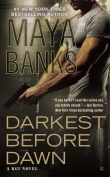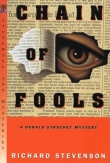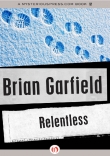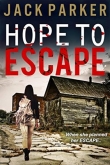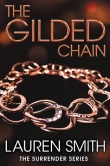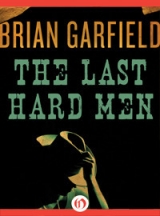
Текст книги "The Last Hard Men"
Автор книги: Brian Garfield
сообщить о нарушении
Текущая страница: 9 (всего у книги 12 страниц)
Provo’s abrasive baritone shot forward. “Let them by, Mike.”
“The hell.” He didn’t look over his shoulder at Provo. “You got no call to do this to her. She never did you any grief.”
“Mike, I won’t mess around with you. You make trouble now and you’ll be mostly a hole.”
The voice was dead-flat. Shelby turned slowly to look. Provo had his rifle across the crook of his elbow, pointed generally at him. Shelby trembled in rage.
Gant and Portugee began to walk up past him. Sunlight raced along Provo’s rifle in a fragmented glitter of darting reflections. Gant and Portugee drew their holster-guns and dropped them on the ground as they walked past; Gant was muttering: “… wipe that touch-me-not look off that high and mighty face of hers.” Gant had a rancid smell. He walked heavily on his heels, undoing his belt. Shelby saw the spittle running from his mouth. He wore an expression of anger rather than lust.
Portugee was breathing fast. His urgent need showed in his trousers. Gant, hot in the face, walked up and dropped his trousers and stood staring at Susan. Gant held his erection in his hand.
Susan sat frozen with dread, sweating, quivering in every rigid limb.
Quesada shouldered past Shelby and went up the slope after them. “I want a piece of this.”
Menendez looked on with sneering contempt. Taco Riva refused to watch: he turned his back and began savagely currying one of the horses. Shelby stood rooted, drenched in sweat and rage.
Will Gant said, “You first, Portugee. I want to watch.”
Portugee didn’t even take down his pants. He just opened his fly and dropped to his knees. He put his hand on Susan’s breast and smiled.
Susan closed her eyes. She sagged to the ground, drawn up like a sick, aged wreck. Shelby couldn’t even tell if she was conscious.
Provo wasn’t even watching them. Provo was watching Shelby. The gun was rock steady in Provo’s hands. Shelby’s fingernails cut into his palms.
Portugee ripped Susan’s shirt open and kneaded her breasts brutally. He was going to take her roughly, as if to reassure himself he was the equal of any other man. He shoved her back against the earth and Shelby heard him say, “Spread her legs out and hold her feet down.” Quesada did it.
Suddenly the girl moved. She made a grab for the knife in Portugee’s belt scabbard. She got it out and whipped it toward his belly.
The tip drew blood. Portugee snapped both hands around her wrist and twisted in opposite directions. The knife fell from her hand and Shelby heard her suck wind in through her teeth. Her head rocked back and her eyes rolled back in her head. Shelby saw her go limp and knew she had lost consciousness.
It didn’t stop them.

Ten

Burgade lay on the ground stunned. His head thundered with pain. He opened his eyes to slits. Light streamed down through the trees, its color very rich.
He saw Hal fingering the field glasses in his lap. They trembled in Hal’s hands. Breath hissed and sawed in and out of him. “I can’t look, either,” Hal said. His face was a twisted ugly mask of anguish and fury.
Burgade wiped his sleeve across his eyes. He rolled over and made a grab for the rifle.
Hal planted his foot on Burgade’s wrist. “No, sir. I don’t want to hit you again.”
“You should have let me shoot.”
“You might have hit Susan. At this range you can’t—”
“Then let me get closer! In God’s name, man—”
“There’s no God,” Hal said. “Not out there.”
Burgade struggled to free his wrist. Hal reached out and picked up the rifle. “No. There’s seven of them.”
“Leave me alone!”
“Sir,” Hal said, his voice shaking, “that’s what they want.”
“Then let them have it!” He jerked his arm free and rolled over.
Hal jumped him, pinned him to the ground. “Get hold of yourself. They haven’t killed her.”
Burgade lay with his face pinned against the ground. A twig dug into his cheek. He heard the rasp of his own, breathing. The pulse thudded in his throat. Hal said in a soft hiss, with calculated brutality, “Women have been fucked before. She can survive it if we can.”
Through the red haze of grief and unthinking total anger, Burgade felt a twinge of awe: that this young man, who loved her, could take it so coolly.
His eyes brimmed: he wept.”
“Are you all right now?”
“Yes.”
Hal let him up. He sat up and wiped dirt and leaves off himself numbly. “What are they doing now?”
“Nothing.”
“What about Susan?”
“She’s lying where they left her. I don’t think she knew what they were doing. I think she fainted. It’s just as well.”
Burgade reached for the field glasses. “Is she—”
“She’s got her clothes on, what’s left of them. And I’m sure she’s not hurt. I saw her move.”
“Not hurt.”
“You know what I mean, sir. She’s alive. That’s what it comes down to, isn’t it? In the end. Staying alive is what matters.”
“You’re a tougher son of a bitch than I ever credited.”
“Yes, sir, I guess I am.”
Burgade spent a long time looking through the field glasses. They had an eight-power magnification but still that only brought the camp up to a hundred yards’ distance; he couldn’t make out details. He saw Susan roll over on her side and draw her knees up. One of the men was standing nearby. He couldn’t tell for certain, but by the set of the man’s head and the movements of his hands it appeared he was talking to Susan, trying to calm her down. It wasn’t Provo. After a long time, eliminating names, he finally decided it had to be Shelby, the kid. He didn’t know whether Shelby was one of the ones who had raped her. He’d seen Gant drop his pants and then he had flung down the field glasses in disbelieving rage. He’d reached for the rifle in a blind savage fury and Hal had knocked him down.
He put down the glasses and took half a dozen evenly spaced deep breaths, with his eyes closed. Finally he looked at Hal. “Thank you.”
Hal was very grave. “Yes, sir. I couldn’t let you do it. I felt the same way you did. But they’d have killed you. And I cant help her, without you. I wouldn’t know what to do. I can help, but you’ve got to point the way for me.”
“You don’t need a weathervane,’Hal. You’re a better man than you think you are.”
“I know my limitations, sir. My ignorances. What I don’t know about this kind of thing would fill an encyclopedia.” Hal’s glance turned outward, past the trees toward the flat. In a different voice he said, “We’re going to get her out of this, sir. You and me. And when we do I’m going to try to make her see that this hasn’t made any difference in the way I feel. It’s going to take a long time and a lot of patience. From you and from me. She’s going to have to travel a long road back before she can trust a man’s hands again—mine or any other man’s.”
Burgade stared at him and listened to the quiet run of Hal’s talk. Suddenly feeling almost burst his throat. He grabbed Hal around the shoulders and hugged him against him and felt the tears wet on his cheeks.
The sun was painful against his grainy eyes. He shaded his brow and studied the sky across and beyond the flats, above the westward summits. He felt utterly drained. It took a supreme effort just to lower his hand to his side. The ground around his feet was still damp, saturated by last night’s pelting rain; the topsoil among these trees was thin, the rock and clay beneath it wasn’t porous, and there was no place for the water to go. But the grass out on the flats had been dried by the day’s blast of sunshine.
It would work. He turned and began to walk back through the trees to the clearing where they had tethered the horses. Weed was there, tied to the bole of an oak, a bandanna gag in his mouth. His face was swollen on one side where Burgade had struck him last night; the eye was puffy and half-closed. He looked bitter.
While Hal fed Weed and gave him water, Burgade squatted with two boxes of rifle cartridges in his lap and the pair of wirecutter pliers that every horseman carried in his kit. They weren’t made for this kind of work but they’d do. He used them to work the lead bullets out of each cartridge. He poured the powder into one of the empty cartridge boxes and when he was through with his methodical chore he had a little more than half a boxful of gunpowder.
The sun was settling toward the horizon. Hal said, “You’ve got something in mind.”
Burgade grunted. “There’s a steady westerly breeze across that meadow. Comes right down off those canyons on the far side. I don’t think it’ll shift for a while. We’re going to have a clear night—that storm blew the clouds over. Quarter moon comes up about ten o’clock. It won’t be too bad a light for shooting.”
“But we can’t go crawling out there, sir. They’d see us easy, against all that pale yellow grass.”
“We’re not going to them, Hal. They’re coming to me.”
Hal nodded toward the box of powder. “That’s got something to do with it, of course?”
“Yes. You’ve got a watch, haven’t you?”
“Yes, sir.”
“All right. It’ll be dark in an hour or so. I want you to take this powder and ride around to the far side of the meadow, down at the bottom—directly opposite where we are now. Circle wide when you go, don’t take chances, and don’t hurry, there’s plenty of time. Tie your horse well back in the trees over there and come down to the edge of timber on foot. The wind will be behind you. You’ll get there about nine o’clock, my judgment. The moon won’t be up yet. Stay in the shadows under the front line of trees there, and spread a thin line of this gunpowder along the edge of the grass, as long as you can make it without gaps. It doesn’t need to be more than a quarter of an inch wide—just a thin ribbon of powder. Then gather up whatever dry kindling you can find and scatter it along there in the grass. The moon will come up, and we’ll need to have it high, so you’ll wait until half past midnight. Got it?”
“Twelve thirty. Yes, sir.”
“Take these matches,” Burgade said. He handed Hal the oilskin pouch. “At half past midnight, post yourself at the center of the line of gunpowder. Then wait for the wind. As soon as you’ve got a fair breeze blowing, touch a match to the powder.”
“In other words, set fire to the grass.”
“Yes. A grass fire will go like hell. It burns low to the ground and makes its own wind as it goes—whips along so fast it won’t even consume the leaves of trees it goes under. It’ll explode across that meadow.”
“I see. And drive Provo this way.”
“On foot. They won’t be able to handle those horses once they smell smoke.”
“Do you think Susan will—”
“That’s what I’m here for,” Burgade said. “I’ll get her away from them in the confusion if I possibly can.”
“And if you can’t?”
“If I can’t we’ll still be better off than we are now. They’ll be up here in the trees where we can get close to them.”
“Yes, sir,” Hal said. “And what then? The reason I’m asking—well, if anything—”
“I know. If anything happens to me you’ll want to know what to do next.”
“I meant no offense.”
“It’s no time for politeness,” Burgade muttered. “If we can’t get Susan away from them tonight, I can’t think of but one thing left to do, and it’s not a thing I expect you to approve.”
“Approve? To hell with that. I’m changing a lot of my notions.”
“Then pick them off one by one.”
“Tall order, sir.”
“Yes. It is.”
“Hal sucked air through his teeth.
Burgade said, “One more thing. Him.” He inclined his head toward George Weed. “When you go around to set the fire, take him with you.”
“What for?”
“We don’t want the rest of them tripping over him and turning him loose, do we. It’d only add another gun against us.”
Hal picked up the powder box and weighed it in his hand. His face was deeply trenched by exhaustion. Dark sweat-circles stained the armpits of his shirt. “I feel as if it’s all a puking rotten dream and I’m never going to wake up from it. We’re talking calmly about killing seven men.”
“My only regret,” Burgade breathed in answer, “is that I can only kill Zach Provo once.”
Burgade looked up. Oak branches were silhouetted against the sky, colorless and jagged like cracks in porcelain. His eyes felt sticky: he was taut as a watch spring, ready to snap. The picketed horses stirred. He heard the light thud of a hoof, the swish of a tail. “Time for you to go. Put Weed on my horse. I won’t have a use for a horse tonight.”
“Won’t you need one for Susan?”
“We’ll have a better chance on foot. Horse makes too much noise.” Burgade walked him over to the animals and helped him cinch them up. His weary muscles throbbed with pain; there was a steady, maddening tremor in his old hands. Even in the dim starlight he could see the ridged dark veins along the backs of his wrists. He said, “As soon as the fire’s burning, ride well around back. Don’t try to mix into whatever may be going on down here—you might shoot me, or get shot by me. Just go on up to that creek where we camped last night. Think you can find it again?”
“Yes, sir.”
“If I can get Susan away, that’s were I’ll take her. If we don’t appear by sunrise you’ll have to use your own judgment.” He turned and grasped Hal’s elbow. “When you come back across, swing wide and take it very slow. You don’t want to fall into any traps. Better leave Weed over there—he’d only clutter things up, and we need the horse more than we need him.”
“I don’t know—what if nobody comes across him? He could die out there, tied up.”
“Let him.” Burgade tightened his grip on Hals arm. “Our lives are more important than his. Important to Susan. I don’t care if Weed lives or dies.”
Hal shook his head slowly. “I know he’s asked for it. But just the same—”
“We’ll pick him up if we can.”
He felt Hal loosen up; he dropped his hand away. Hal said, “I guess I know, you’re right, sir, but it’s a hell of a thing to have to do.”
“I know.”
Hal’s eyes came up. “Look, you be careful too.”
“I don’t intend to let them get at me until I’ve finished what we came here to do.”
“Susan’s going to need you, sir. It may not matter to you if they kill you in the end. But it matters to her. You understand what I’m saying?”
Burgade turned away. “Let’s get Weed on his horse.”
He picked a spot with care. At first he thought of climbing a tree to get a better command of the meadow. But he was too weak. And even if he could get himself up into one of the oaks, he’d be lucky to get down again without snapping his brittle bones.
He chose a fallen dead tree just inside the edge of the forest. Sat down on the deadfall trunk and arranged his rifle and field glasses at hand. From here he could see the whole meadow.
After the moon came up he fixed his field glasses on the camp and kept watch through the ticking silence of the night. There was always the chance Provo would decide to move.
He kept thinking about what Hal had said. From the beginning of the chase he had resigned himself; he had not expected to come out alive. He hadn’t much cared. They could have his old used-up hide, if that was the price of Susans life. But there was a chance Hal was right: if this thing hadn’t broken her, destroyed her beyond repair, it had come close. She would need gentle patience, protective love. His own death might mean nothing to him; to her it might be the final injury, and too much for her gentle spirit to accept all at once.
There had been nothing beyond Susan’s rescue and vengeance upon Provo. An old man, fit for nothing but a slow bitter draining of final years in the Pioneers’ Home—guttering out, in the end, like the noxious stub of a used-up candle. It occurred to him that a part of him had wanted to end it clean, up here in the high country that was unchanged from forty years ago: to make a last valiant fight of it, take Provo with him, go out in a hysterical blaze of glorious violence: a far more fitting finish for Sam Burgade. Storybook ending, high tragedy.
An indulgence, he saw now. A cheap poetic fantasy. An old man’s pathetic dream, images of William S. Hart meeting a Shakespearean death in the last reel.
A corner of his vanity resented Hal’s wisdom. Hal, clear-eyed and sensible, had destroyed the dream.
But Hal had replaced it with something important. She’ll need me, he thought. The wonder of it made his old hands steady, made his jaw creep forward to lie in a hard line. She’ll need me.
How long had it been since anybody had needed Sam Burgade?
He sat there for hours, shifting his buttocks on the hard wood. Wind-stirred leaves made moving shadows along the moonlit ground. He kept checking his watch at close intervals and when it went past midnight he began to hear the beat of his own heart. The light seemed to grow brighter, every tiny sound louder. He played the field glasses over the pale silver meadow and his eyeballs seemed to scrape the sockets.
He’d told Hal half past midnight. Five minutes ahead of the appointed moment he picked up the .06 Springfield and jacked the bolt halfway open to make sure a cartridge was chambered in the breech. He snicked the safety off and hunched himself forward with his elbows on his knees, wrapping himself around the rifle like a ‘possum, holding the field glasses in one hand in such a way that he could drop them instantly and bring the rifle to bear in the same brief movement.
He heard crickets in the trees. Sweat prickled his scalp, breaking out like needles.
In the eight-power lenses he could see the horses plainly, the prone shapes of half a dozen figures, and two men sitting up with rifles, at opposite sides of the camp. One of them got up, restless, and walked back and forth.
The air was quite still. He’d told Hal to wait for a wind. His hands sweated and he wiped them one at a time on his trousers, and leveled the rifle again, locked it in tight in a marksman’s grip. The steel butt plate was cold through his clothing against his bony shoulder.
The cropped grass began to ripple, long silver glimmers like ocean swell. He locked the field glasses against the bridge of his nose and stared until his eyes ached. The breeze stirred his hair where it curled out under the hatbrim.
Abruptly, through the glasses, he saw a thin ribbon-stripe of light burst into sight at the bottom of the meadow. It looked like the crack of light under a closed door: trees and mountains grew darker behind it. It spread with a rush.
The pacing sentry stood bolt still. Burgade saw his shoulders lift when he filled his chest with air to give the alarm. The shout was thin in the distance. Figures on the ground began to stir.
The fire blasted forward like whitewater cascades. Unsteady winds spread it wider and wider. It raced forward, gathering brightness, throwing diamond sparks; whipped along, low to the ground and vicious.
Several men in camp were on their feet. It took them time to realize what was happening. Voices of surprise and querulous discovery rode the wind. Burgade held the glasses in rock-steady hands. He had them silhouetted against the fire now: he began to sort them out. He was looking for Susan.
The low racing blaze licked out at both sides, hungry for fuel, making its own hot wind now: rolling smoke shot forward from the crest. The fire’s heat expanded the air around it, accelerating the flames, turning them blue-yellow. Spreading like poured oil, it flashed out past its own edges, widening the swath—within seconds it covered half the width of the lower meadow. With quick fury it consumed its sparse spindly fuel and raced on to find more.
The camp was in panic. One man—it had to be Riva—had gone running toward the horses. Four or five of them were rearing and plunging. Riva dodged in among them, bent low in a crouch: Burgade caught the quick flash of light along an outstretched blade—Riva was cutting the hobbles. One by one the terrified horses leaped away and bolted forward until there were only three left. Evidently the three had not been unsaddled. Riva had them by the reins, he was fighting to keep them still. Out there, by now, the smell of smoke must be powerful. Burgade’s own nose caught a hint of it. Through the high-resolution lenses he saw two or three men break for it, running up on foot, not toward Burgade but off at an angle that would bring them into the trees two hundred yards to his right. He focused the glasses on them long enough to make sure Susan was not among them, and swung the glasses back.
Riva was with the horses, climbing up into a saddle, shouting something. The horses were dancing, rearing; nobody ran toward Riva, and after a brief moment more, Riva spurred the horse he was riding and led the other two horses away with him at a dead gallop, heading directly toward Burgade. Behind Riva, three men were moving across the camp on foot, starkly outlined against the flames. Zach Provo’s clawed praying mantis silhouette was unmistakable. Burgade sucked breath sharply into his lungs. Then, for a brief instant, he glimpsed Susan—on her feet, running. She’d been hidden, from his sight behind the horses.
But now Riva came veering forward, cutting off Burgade’s view of the camp: the three horses loomed heavy in the field glasses. Riva was drumming straight toward him, high and sharp-shouldered in the saddle.
He had to get those horses out of his line of sight. He braced the Springfield against his shoulder and dropped the glasses; took aim with deliberate care and fired, at four hundred yards.
Wherever the bullet went, it missed its target. Burgade racked the bolt open and slammed it shut, settled his aim and squeezed like a target-range shooter, not breathing, not closing either eye. When the Springfield went off it surprised him, as it should: and Riva threw up his arms and pitched back off his horse.
Freed, the three horses scattered in panic. Burgade fumbled for the glasses at his feet. The fire swarmed across the width of the meadow, crowding up with savage speed. The low angle of view made it hard to tell how close it was to the camp. Three of the men had run up toward the timber at Burgade’s right; they were almost into the trees now but he didn’t waste attention on them. One of the loose horses ran into the trees and he heard it crashing around. He could taste smoke now. He swung the field glasses to bear on the camp—the flames had almost reached it; but the four figures hadn’t begun to run for it.
Susan was out there. Burgade’s eyes went wide. He saw Provo shouting, making gestures. Provo had a grip on Susan’s wrist. She was trying to run; Provo held her back. Burgade hardly spared the two other men a glance; he didn’t care who they were. He saw Provo bend down and butt his shoulder against Susans midriff and straighten up with Susan across his back in a fireman’s carry, one arm across the backs of her knees; carrying her like that, Provo turned and ran back toward the other two men. The fire rushed forward, obscuring things in smoke, but Burgade caught fragmentary images: the three men wheeling through the smoke, jogging away from him—
—Provo was running into the fire!
In that sudden split moment of time he knew. Provo had not panicked. Provo had judged the speed of the flames, the sparse grass it fed on. Provo knew the fire had been set to drive him up this way. And Provo hadn’t fallen for it. Provo was going through the fire—he would break out of it, behind it, and run across the burned earth into the trees beyond.
He had a brief glimpse of one of them leaping high, running desperately, boots plunging through the low flames. Then they were gone—through and beyond, hidden from him by the blaze.
His eyes stared without believing. The whipping flames rushed forward—smoke began to burn his throat. His eyes started to water. Got to think. Get a grip. His head jerked around to the right—three of them had gone into the trees up that way. Possibly they’d seen the muzzle-flame of his rifle, shooting Riva down. He had to move away from this spot, keep from being ambushed. He swung his feet over the deadfall and went swiftly back deeper into the forest, lugging the Springfield and the glasses. He kept moving uphill; the low white moon ran along with him, above the treetops.
Out of breath, he stopped on a slope and looked down. Through the trees he could see the fire’s tail whip around, curling toward the trees off to the left. It would hit the rain-logged ground and the damp floor of the forest, and burn itself out against that moisture; not much chance of a forest fire catching. He searched the lower woods for movement. There was a good chance of picking it up against the firelight beyond.
He saw movement in two or three places but inspection proved it was only Riva’s horses, dashing around in fear. Burgade leaned against a tree and gulped wind. His chest heaved, his leg muscles trembled. Think.
Provo had got away with Susan. Over on the far side. Instinct urged him to get over there as fast as he could and get after them. But a cooler second thought stopped him. No good to go after Provo with these three over here behind him. They might spot him, rig a crossfire. No. The thing to do was take these three out of the fight first. The fire had separated them from Provo. Fear would be working on them. They wouldn’t be thinking about Provo, or Susan, or even Provo’s gold. They’d be thinking about flight. Afraid of hidden guns in the dark forest. Get away from here—that was what they’d want.
Flight meant horses. Those three would be coming down this way, where Riva’s horses had entered the trees. They’d come not for Burgade but for the horses.
That was it, then. Get close to the horses and wait for the men to come. Burgade nodded. His breath had evened out. He began to work his way down through the timber.
The horses were easy to follow. Innate herd-habit had drawn them together and they made plenty of noise, banging around in the trees. As soon as they had got beyond smell of the smoke they had begun to calm down. When Burgade caught up with them they were moving slowly through the forest, starting to browse leaves and grass tufts. Three were saddled. In a short while they began to mill. He counted six, and that gave him pause: there had been nine to begin with—the other three had drifted off in some other direction, or Provo’s men had captured them. In the latter case, it meant no one would be coming after these six horses. Not for quite a while, at least.
The chances were diminishing: he cursed the shift, but there was no point speculating about those missing three horses. He’d picked his strategy; now he had to play it out. If nobody came looking for the horses in an hour or so, he’d have to try something else, but in the meantime—Lord Jesus!
He wheeled on his feet and stared back the way he had come. Of all the fool stupid things to do … The ground here on the hill was still dew-damp from last night’s downpour. His own tracks, superimposed over the prints of the idling horses, were clear for anybody to follow. Right out in front of God and everybody. You’re getting senile.
Well, he could hardly try to wipe them out, he’d only be obscuring the horse prints too.
He was old, he was dead tired, and it took him four or five minutes standing there in the silence to figure out what thirty years ago he’d have done instinctively. It left him profoundly depressed, more so than before, because now for the first time he felt the crawl of uncertainty in him as his self-confidence, which was the one thing that had kept him going, began to drain. He had pumped himself full of arrogance: now all of a sudden he was allowing himself to realize how poor his chances really were—of getting near Provo at all, of getting Susan away, of even staying alive through the next six hours.
He knew what to do to solve the immediate problem. The knowledge didn’t cheer him, because it had taken him such a long sluggish time to work it out in his head. Provo wasn’t going to give him that kind of time. So he did what had to be done, but he did it without heart. He kept on walking boldly ahead until he was within a few yards of the horses and they had stopped grazing to peer at him in spooky suspicion. Then, where one of the horses had stood and churned up the ground a little as if waiting for a rider to get mounted, he dug his right boot-toe deep into the earth, to leave a sharp toe-print of the kind that might have been left by a man putting his left foot into a stirrup and pushing himself up on his right tiptoe to get mounted.
Then he backtracked, carefully. Walked backward in his own tracks, careful to put his weight on his heels. He backed up until he was beside a mossy patch of rocks. Stepped to one side onto the rocks, leaving no tracks, and faded back into the woods, walking on brush and deadwood, leaving no sign that a casual eye would discern. He circled close in alongside the track again and posted himself at a crouch, hidden from the trail by heavy bushes and tree trunks but within three or four feet of the line of his own footprints. He cradled the rifle and waited for them to come.
He was counting on the three of them coming together—not in a tight-packed bunch, but spread out behind another for mutual protection. But it would work as well if fewer than three came; it would only mean he would then have to find whoever hadn’t come this way, and that would take longer. He was up against the factor of time, partly because time would fray Provo’s nerves, partly because he himself needed sleep badly and could not go much longer without.
He didn’t trust his old brain: he worked it out step by step in his mind to make sure he had not made some stupid mistake. Assume all three of them came, looking for the horses. In the moonlight they wouldn’t have counted the number of horses by the tracks; they wouldn’t know whether there had been six horses or seven. They would come along here, following the tracks, following Burgade’s bootprints. The bootprints would make them wary and they’d be spread out quite wide of each other, but at least one of them would be on this trail. Or they’d be single file, separated. In the former case he’d jump the nearest one and try to put him away silently, without alarming the others. In the latter case he’d let the first two go by and then jump the third one, then close in behind the other two while they reached the sudden end of his bootprints. They would assume Burgade had mounted one of the horses and ridden away on it; by the time they spotted the fact that there were no hoofprints leading away from the six remaining horses, Burgade hoped to be on top of them.

